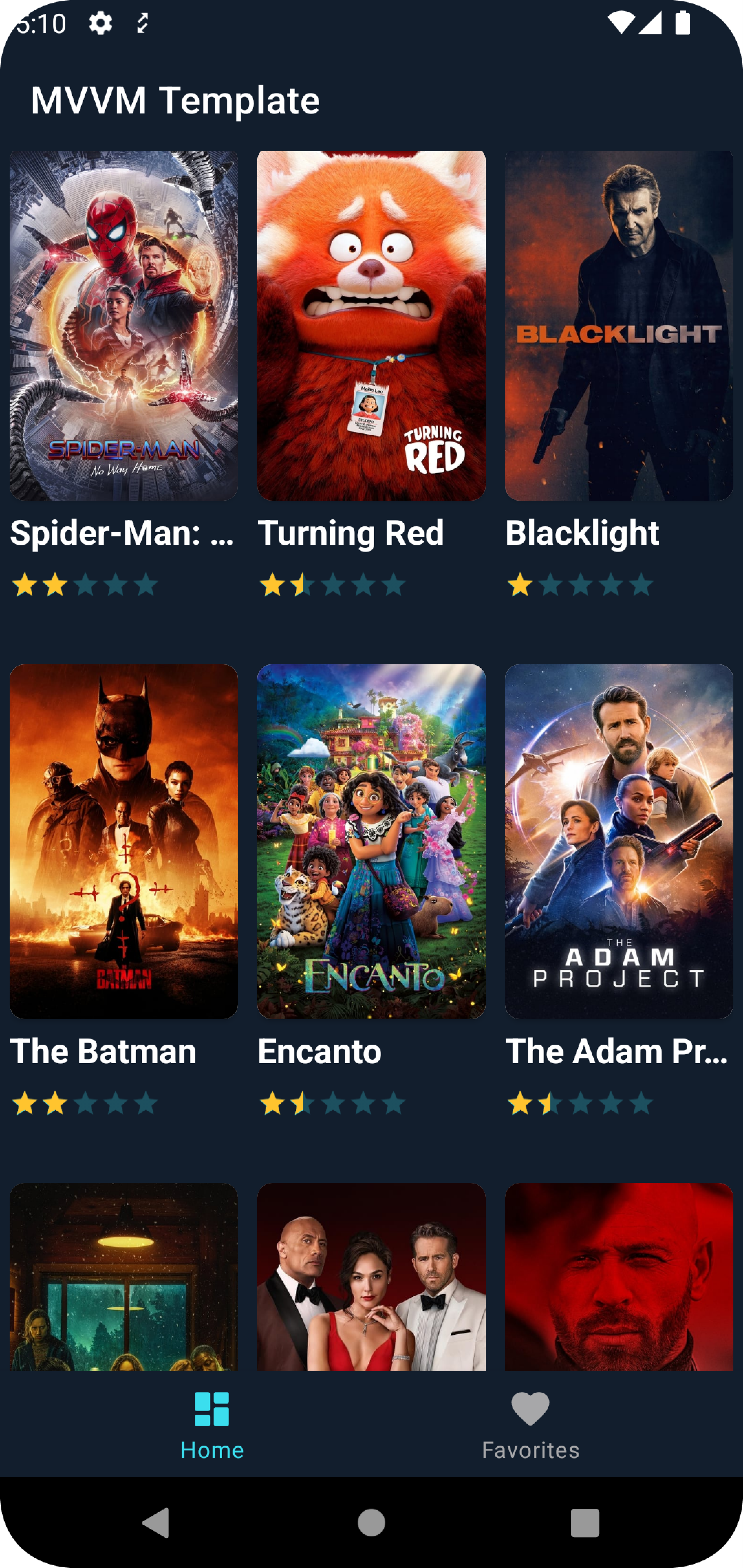https://github.com/kl3jvi/clean_modularized
:popcorn: Movie Android App written in Kotlin, MVVM, Clean Architechture, Modularized, Coroutines, Android Architecture Components and Hilt.
https://github.com/kl3jvi/clean_modularized
android coroutines-android hilt-android modularization mvvm-android
Last synced: 10 months ago
JSON representation
:popcorn: Movie Android App written in Kotlin, MVVM, Clean Architechture, Modularized, Coroutines, Android Architecture Components and Hilt.
- Host: GitHub
- URL: https://github.com/kl3jvi/clean_modularized
- Owner: kl3jvi
- Created: 2022-03-07T13:35:33.000Z (almost 4 years ago)
- Default Branch: master
- Last Pushed: 2022-03-20T14:03:55.000Z (almost 4 years ago)
- Last Synced: 2025-03-22T15:51:41.534Z (11 months ago)
- Topics: android, coroutines-android, hilt-android, modularization, mvvm-android
- Language: Kotlin
- Homepage:
- Size: 4.33 MB
- Stars: 18
- Watchers: 1
- Forks: 4
- Open Issues: 0
-
Metadata Files:
- Readme: README.md
Awesome Lists containing this project
README

[](https://kotlinlang.org)
[](https://developer.android.com/studio/releases/gradle-plugin)
[](https://gradle.org)
This is a sample project that presents a modern approach to [Android](https://en.wikipedia.org/wiki/Android_(operating_system)) application development.
The goal of the project is to combine popular libraries/tools and demonstrate best developement practices by utilizing up to date tech-stack and presenting modern Android application [Architecture](#architecture) that is modular, scalable, maintainable, and testable. This application may look simple,
but it has all the pieces that will provide the rock-solid foundation for the larger app suitable for bigger teams
and long [application lifecycle](https://en.wikipedia.org/wiki/Application_lifecycle_management).
This project is being maintained to match industry standards.
## Project characteristics and tech-stack

This project takes advantage of best practices, many popular libraries and tools in the Android ecosystem. Most of the libraries are in the stable version unless there is a good reason to use non-stable dependency.
* Tech-stack
* [100% Kotlin](https://kotlinlang.org/) + [Coroutines](https://kotlinlang.org/docs/reference/coroutines-overview.html) - perform background operations
* [Retrofit](https://square.github.io/retrofit/) - networking
* [Jetpack](https://developer.android.com/jetpack)
* [Navigation](https://developer.android.com/topic/libraries/architecture/navigation/) - in-app navigation
* [LiveData](https://developer.android.com/topic/libraries/architecture/livedata) - notify views about database change
* [Lifecycle](https://developer.android.com/topic/libraries/architecture/lifecycle) - perform an action when lifecycle state changes
* [ViewModel](https://developer.android.com/topic/libraries/architecture/viewmodel) - store and manage UI-related data in a lifecycle conscious way
* [Room](https://developer.android.com/jetpack/androidx/releases/room) - store offline cache
* [Koin](https://insert-koin.io/) - dependency injection
* [Coil](https://github.com/coil-kt/coil) - image loading library
* [Lottie](http://airbnb.io/lottie) - animation library
* [Stetho](http://facebook.github.io/stetho/) - application debugging
* Modern Architecture
* Clean Architecture (at feature module level)
* Single activity architecture using [Navigation component](https://developer.android.com/guide/navigation/navigation-getting-started)
* MVVM + MVI (presentation layer)
* [Dynamic feature modules](https://developer.android.com/studio/projects/dynamic-delivery)
* [Android Architecture components](https://developer.android.com/topic/libraries/architecture) ([ViewModel](https://developer.android.com/topic/libraries/architecture/viewmodel), [LiveData](https://developer.android.com/topic/libraries/architecture/livedata), [Navigation](https://developer.android.com/jetpack/androidx/releases/navigation))
* [Android KTX](https://developer.android.com/kotlin/ktx) - Jetpack Kotlin extensions
* CI
* [GitHub Actions](https://github.com/features/actions)
* Automatic PR verification including tests, linters and 3rd online tools
* Testing
* [Unit Tests](https://en.wikipedia.org/wiki/Unit_testing) ([JUnit 5](https://junit.org/junit5/) via
[android-junit5](https://github.com/mannodermaus/android-junit5))
* [UT Tests](https://en.wikipedia.org/wiki/Graphical_user_interface_testing) ([Espresso](https://developer.android.com/training/testing/espresso))
* [Mockk](https://mockk.io/) - mocking framework
* [Kluent](https://github.com/MarkusAmshove/Kluent) - assertion framework
* UI
* [Material design](https://material.io/design)
* Reactive UI
* Static analysis tools
* [Ktlint](https://github.com/pinterest/ktlint) - validate code formating
* [Detekt](https://github.com/arturbosch/detekt#with-gradle) - verify complexity look for and code smell
* Gradle
* [Gradle Kotlin DSL](https://docs.gradle.org/current/userguide/kotlin_dsl.html)
* Custom tasks
* Plugins ([SafeArgs](https://developer.android.com/guide/navigation/navigation-pass-data#Safe-args),
[android-junit5](https://github.com/mannodermaus/android-junit5))
* [Dependency locks](https://docs.gradle.org/current/userguide/dependency_locking.html)
* [Versions catalog](https://docs.gradle.org/7.0-milestone-1/userguide/platforms.html)
## Architecture
Feature related code is placed inside one of the feature modules.
We can think about each feature as the reusable component, equivalent of [microservice](https://en.wikipedia.org/wiki/Microservices) or private library.
The modularized code-base approach provides few benefits:
- better [separation of concerns](https://en.wikipedia.org/wiki/Separation_of_concerns). Each module has a clear API., Feature related classes live in different modules and can't be referenced without explicit module dependency.
- features can be developed in parallel eg. by different teams
- each feature can be developed in isolation, independently from other features
- faster compile time
## Package Structures
```
com.kl3jvi.mvvm_template # Root Package
├─ app
├─ buildSrc
├─ feature_home
└──feature_favorites
```